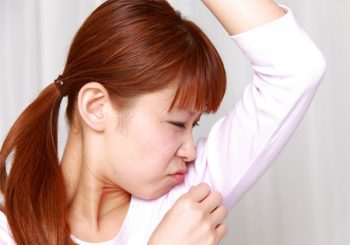Contributing writer for Wake Up World
Americans spend $18 billion a year on deodorant and antiperspirant in a quest to cover up body odor and reduce sweating.1 For many, applying deodorant is a regular part of their morning routine, but it hasn’t always been this way.
The first deodorant, which killed off odor-producing bacteria, wasn’t introduced until 1888. The first antiperspirant, which reduces both bacterial growth and sweat production, came about 15 years later. Even then, however, most people were wary of applying such products to their underarms.
The Smithsonian wrote of these early products, “many people — if they had even heard of the anti-sweat toiletries — thought they were unnecessary, unhealthy or both.”2
It wasn’t until the early to mid-1900s that the idea of regular deodorant usage took off, thanks to a clever copywriter who created controversial advertisements warning women that their armpits might be smelly and they might not even know it.
The strategy of exploiting female insecurity worked, the Smithsonian reported, with sales of one deodorant reaching $1 million by 1927.3
In 2016, we’ve come full circle in a sense, as some people are realizing that applying various personal care products every day isn’t always necessary, effective or, importantly, healthy. Do you need to worry about the health risks of applying your deodorant?
Antiperspirants May Kill Off Beneficial Armpit Bacteria
It’s becoming widely known that your body’s microbes play an intricate role in your health. You cannot survive without them, and it’s best to work with them, for instance by eating fermented foods and avoiding antibacterial soaps, rather than killing them off indiscriminately.
Researchers recently revealed, however, that habitual use of deodorants and antiperspirants has a significant effect on armpit bacterial density and variation.
For starters, when use of such products was discontinued, there was a marked increase in bacterial density, approaching that which was found among individuals who regularly do not use any such products.
When antiperspirants were applied, bacterial density dramatically declined and differences in the types of bacteria were also noted. According to the study, which was published in the journal PeerJ:4
” … [I]ndividuals who used antiperspirants or deodorants long-term, but who stopped using product for two or more days as part of this study, had armpit communities dominated by Staphylococcaceae, whereas those of individuals in our study who habitually used no products were dominated by Corynebacterium.
Collectively these results suggest a strong effect of product use on the bacterial composition of armpits.
Although stopping the use of deodorant and antiperspirant similarly favors presence of Staphylococcaceae over Corynebacterium, their differential modes of action exert strikingly different effects on the richness of other bacteria living in armpit communities.”
There’s still a lot to learn about what health effects this microbial tweaking may cause, although it’s known that Corynebacterium bacteria, which produce body odor, may help protect against pathogens while Staphylococcaceae bacteria can be beneficial or dangerous.5
Antiperspirants May Increase Odor-Producing Bacteria in Your Armpits
The reason your sweat smells is because the bacteria living in your armpits break down lipids and amino acids found in your sweat into substances that have a distinct odor.
Antiperspirants address this problem using antimicrobial agents to kill bacteria and other ingredients such as aluminum that block your sweat glands. However, separate research has revealed antiperspirants affect the bacterial balance in your armpits, leading to an even more foul-smelling sweat problem.6
Those who used antiperspirants saw a definitive increase in Actinobacteria, which are largely responsible for foul-smelling armpit odor. Other bacteria found living in people’s armpits include Firmicutes and Staphylococcus, but the odors they produce are milder, and they’re not produced quite as readily.
It turned out the less odor-causing bacteria may be killed off by the aluminum compounds (the active ingredient in most antiperspirants), allowing bacteria that produce more pungent odors to thrive instead.
In some participants, abstaining from antiperspirant caused the population of Actinobacteria to dwindle into virtual nonexistence.
This means using an antiperspirant may make the stink from your armpits more pronounced, while quitting antiperspirants may eventually mellow the smell. The researchers explained in Archives of Dermatological Research:7
“A distinct community difference was seen when the habits were changed from daily use to no use of deodorant/antiperspirant and vice versa … Antiperspirant usage led toward an increase of Actinobacteria, which is an unfavorable situation with respect to body odor development.
These initial results show that axillary cosmetics modify the microbial community and can stimulate odor-producing bacteria.”
Is There a Link Between Antiperspirant and Cancer?
If you look at the ingredients in your antiperspirant, you’ll likely find that it contains aluminum, which acts as a “plug” in your sweat ducts to reduce sweating.
Aluminum antiperspirants may act as a long-term source of exposure to aluminum, which research suggests may accumulate in breast tissue in women.
This is problematic for a number of reasons, as aluminum may cause alterations to DNA as well as epigenetic effects that could potentially support cancer development.8
Aluminum (specifically aluminum chloride and aluminum chlorohydrate) is also known to interfere with estrogen receptors in breast cancer cells, and estrogen plays a well-known role in breast cancer.
Studies also show a high incidence of breast cancer in the upper outer quadrant of the breast, nearest to where antiperspirants are applied, together with “genomic instability.”9Back in 2005, researchers concluded:
“Given the wide exposure of the human population to antiperspirants, it will be important to establish dermal absorption in the local area of the breast and whether long term low level absorption could play a role in the increasing incidence of breast cancer.”
In 2013, researchers found increased levels of aluminum in nipple aspirate fluid from women with breast cancer compared to women without the disease. They also detected increased levels of inflammation and oxidative stress, noting:10
” … [O]ur results support the possible involvement of aluminum ions in oxidative and inflammatory status perturbations of breast cancer microenvironment, suggesting aluminum accumulation in breast microenvironment as a possible risk factor for oxidative/inflammatory phenotype of breast cells.”
Parabens in Deodorant May Be Linked to Breast Cancer
Parabens are preservatives that are found in many antiperspirants and deodorants. These chemicals have estrogenic activity in human breast cancer cells, and research published in 2012 found one or more parabens in 99 percent of the 160 tissue samples collected from 40 mastectomies.11
Separate research also detected parabens in 18 of 20 tissue samples from human breast tumors.12
While a definitive link hasn’t been made, the growing collection of research suggests caution is warranted. Considering chemical antiperspirants and deodorants are an optional product, it may be a risk that’s not worth taking.
Are Natural Deodorants Safe?
In general, deodorants may be somewhat safer than antiperspirants simply because they don’t typically contain aluminum. There are many brands of aluminum-free antiperspirants on the market, as well, and some of these are safer alternatives. However, be aware that aluminum is just one of the toxic ingredients in personal care products — you can find other chemical toxins to avoid in your personal care products in the infographic below.
Alternatively, just use plain soap and water. This is what I use, typically in the morning and after I exercise. A paste made from baking soda and water also works as a natural deodorant.
 Your skin is your largest organ, and anything you put on it should contain only the best and safest ingredients from nature. So before slathering lotion or body wash on your skin, take a look at this infographic on toxic chemicals found in personal care products. Discover these common yet deadly chemicals and how they can potentially sabotage your health and well-being.
Your skin is your largest organ, and anything you put on it should contain only the best and safest ingredients from nature. So before slathering lotion or body wash on your skin, take a look at this infographic on toxic chemicals found in personal care products. Discover these common yet deadly chemicals and how they can potentially sabotage your health and well-being.
Tips for Reducing Your Body Odor Naturally
Body odor certainly isn’t dangerous, but it can be offensive to others. Not everyone produces smelly sweat under their arms, by the way. About 2 percent of people have a single gene variation that leaves their underarms sweat- and odor-free. It’s the same gene variation that causes dry flaky earwax as opposed to “wet” sticky earwax. Research shows that even these odor-free people typically use deodorants and antiperspirants anyway, even though they don’t need to.13
If you have foul body odor, this is typically related to toxins being expelled; it’s probably not your “natural” scent. If you’re living a “clean” lifestyle, meaning a lifestyle in which you’re minimally exposed to dietary and environmental toxins and therefore have a low toxic burden, your sweat will be close to odorless.
Please don’t attempt to stop your body’s natural sweating by using antiperspirants. Profuse sweating can actually help decrease body odor. Your body releases sweat to help regulate its body temperature to prevent you from overheating, and there are many other benefits to it as well.
Sweating helps your body to eliminate toxins, which supports proper immune function and helps prevent diseases related to toxic overload. Sweating may also help kill viruses and bacteria that cannot survive in temperatures above 98.6 degrees Fahrenheit, as well as on the surface of your skin.
Interestingly, research involving bacterial transplants to stop excessive body odor is being conducted. The idea is to fight odor-causing bacteria with their own kind: more bacteria. Researchers explained:14
“We have done transplants with about 15 people, and most of them have been successful … All have had an effect short term, but the bad odor comes back after a few months for some people.”
Another option for eliminating body odor, aside from washing regularly with soap and water, is exposure to sunlight. Ultraviolet light, specifically UVB, is a very potent germicidal. I have noticed that by tanning my armpits it eliminates armpit odor nearly completely, probably because the UVB kills any odor-causing bacteria.
As mentioned, a paste of baking soda and water is an effective deodorant for some people. You can also try dabbing a bit of apple cider vinegar under your arms. If you want a deodorant that smells great and can be put into “stick” form like you may be used to, try Tree Hugger’s natural recipe below.15
Homemade Natural Deodorant With Coconut Oil16
Ingredients:
- 3 tbsp virgin coconut oil
- 2 tbsp shea butter
- 3 tbsp baking soda
- 2 tbsp cornstarch
- 5 drops essential oil (lavender, orange, etc.)
Method:
- Make a double boiler by placing a half-pint glass jar in the middle of a small pot of water. Bring water to a simmer. Add coconut oil and shea butter to the jar and let melt.
- Turn off the heat, add baking soda and cornstarch, and stir until completely smooth. Mix in the essential oil of your choice. Let cool.
- At room temperature, the deodorant is hard. You can scrape out a small ball and apply it directly to your armpits, or transfer it to an old deodorant tube for easier application.In warmer months, you’ll need to keep this deodorant in your refrigerator to prevent the coconut oil from liquefying.
Article sources:
- PeerJ February 2, 2016
- The Guardian February 3, 2016
- TIME February 4, 2016
- 1,2,3Smithsonian August 2, 2012
- 4PeerJ February 2, 2016
- 5TIME February 4, 2016
- 6,7Arch Dermatol Res. 2014 Oct;306(8):701-10
- 8,9J Inorg Biochem. 2005 Sep;99(9):1912-9
- 10J Inorg Biochem. 2013 Nov;128:250-6
- 11Journal of Applied Toxicology January 12, 2012: 32(3); 219-232
- 12J Appl Toxicol. 2004 Jan-Feb;24(1):5-13
- 13J Invest Dermatol. 2013 Jul;133(7):1760-7
- 14NPR September 5, 2014
- 15,16Tree Hugger March 4, 2014
About the author:
Born and raised in the inner city of Chicago, IL, Dr. Joseph Mercola is an osteopathic physician trained in both traditional and natural medicine. Board-certified in family medicine, Dr. Mercola served as the chairman of the family medicine department at St. Alexius Medical Center for five years, and in 2012 was granted fellowship status by the American College of Nutrition (ACN).
While in practice in the late 80s, Dr. Mercola realized the drugs he was prescribing to chronically ill patients were not working. By the early 90s, he began exploring the world of natural medicine, and soon changed the way he practiced medicine.
In 1997 Dr. Mercola founded Mercola.com, which is now routinely among the top 10 health sites on the internet. His passion is to transform the traditional medical paradigm in the United States. “The existing medical establishment is responsible for killing and permanently injuring millions of Americans… You want practical health solutions without the hype, and that’s what I offer.”
Visit Mercola.com for more information, or read Dr. Mercola’s full bio and resumé here.
True forgiveness isn’t about letting go of anger or expecting apologies from others. It’s a profound inner shift that releases your attachment to past hurts, creating space for emotional freedom and peace. In this powerful, free online event, you’ll learn the core principles of true forgiveness and how to surrender to a life of healing and fulfillment.
When you hold onto past resentment, you unknowingly block yourself from manifesting your dreams and happiness. True forgiveness allows you to let go of shame, regret, and guilt, freeing you to attract love, prosperity, and creativity into your life. Real-life stories demonstrate the transformative effects of embracing true forgiveness on relationships, health, and careers.
Take the first step towards healing today. Join our free online event, The Power of Surrendering to TRUE Forgiveness, and unlock the peace and freedom you deserve. RSVP now!
If you’ve found value in our articles, we invite you to support the release of our brand-new book, “Gratitude Practices for Kids: A Practical Guide for Adults to Instill a Spirit of Appreciation and Positivity in the Next Generation.“
“Gratitude Practices for Kids” brings together over 25 innovative and accessible practices designed to enhance gratitude in everyday life. This comprehensive guide is backed by 17 scientific studies, ensuring each concept is grounded in research, underscoring our commitment to nurturing growth, emotional intelligence, and positive interactions between adults and children.
We encourage you to opt for the paperback version to celebrate this new release. Dive into its fresh pages away from digital distractions, allowing you to immerse yourself in the transformative practices it offers.
Over recent years, Wake Up World has faced significant online censorship, which has impacted our financial ability to operate. Moving into book publishing represents a strategic step to secure the ongoing funds needed to continue our mission. By purchasing Gratitude for Kids, you help us keep our content free and accessible to everyone, avoiding needing a paywall. With over 8,500 articles published in the last 13 years, we remain dedicated to keeping our valuable content open to all.











